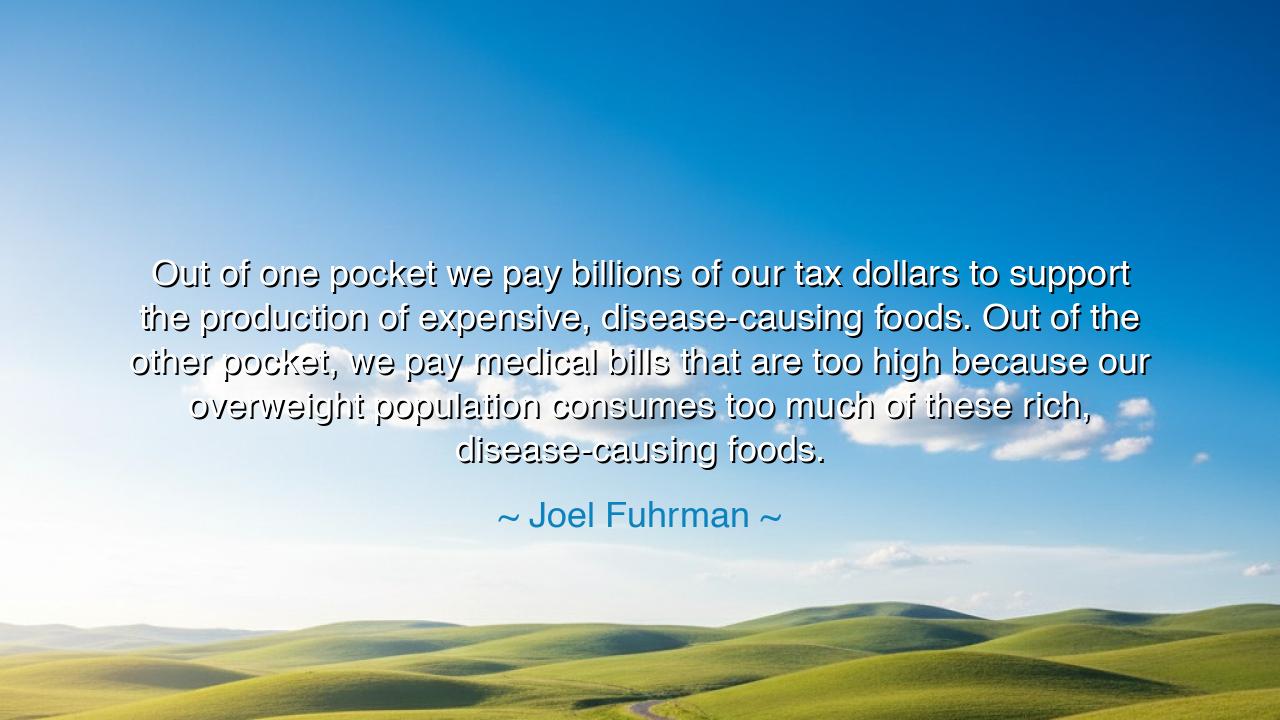
Out of one pocket we pay billions of our tax dollars to support
Out of one pocket we pay billions of our tax dollars to support the production of expensive, disease-causing foods. Out of the other pocket, we pay medical bills that are too high because our overweight population consumes too much of these rich, disease-causing foods.






Hear, O children of wisdom, the words of Joel Fuhrman, who proclaimed with clarity and lament: “Out of one pocket we pay billions of our tax dollars to support the production of expensive, disease-causing foods. Out of the other pocket, we pay medical bills that are too high because our overweight population consumes too much of these rich, disease-causing foods.” In these words lies both accusation and sorrow, for they reveal the tragic cycle of a people who nourish their own destruction while emptying their treasure to heal the wounds they themselves have inflicted.
The meaning of this utterance is twofold. First, it speaks of the folly of a nation that pours its gold into the cultivation of foods heavy with sugar, fat, and poison to the body. Second, it reveals the bitter irony that the same nation must then pour even greater riches into the tending of the sick, who suffer from diseases born of the very foods their taxes have sustained. Thus, the people are enslaved not by invaders, nor by kings, but by their own appetites and by the cunning hands of industries that profit from both nourishment and sickness alike.
This problem, ancient though it feels, is also modern in its form. Consider the tale of the Roman elite in the final centuries of empire. They feasted upon meats drowned in sauces and wines flowing without measure, while the common people suffered. In time, the strength of Rome decayed, not only through invasion, but through the corruption of body and spirit. Their indulgence became their weakness, and their weakness, the downfall of their glory. So too, Fuhrman warns, shall it be with any nation that feeds itself with disease-causing foods and then burdens its healers with the consequences.
The origin of Fuhrman’s wisdom comes from his life as a physician, a healer who has seen the battlefield of modern disease. He has watched patients suffer from the weight of their own choices—choices shaped not only by desire but by systems that reward the making of cheap poison in shiny packages. His cry is not merely against the people but against the powers that subsidize destruction, who turn fertile soil into a field of death disguised as abundance. His words carry the pain of a prophet who sees both the personal tragedy and the national folly of a land where both pockets are emptied, yet health and happiness are not gained.
Let us not take his message as condemnation alone, but as a call to wisdom and action. The body is a temple, and its care is a sacred duty. To fill it with poison for fleeting pleasure is to desecrate it. And yet, to reform is possible, for the same hands that reach for destruction can be taught to reach for life-giving fruits, grains, and herbs. The cycle may yet be broken if the people awaken to the truth and demand that their leaders sow health instead of sickness, and that their own households become gardens of life rather than storehouses of disease.
The lesson for us is clear: what we choose to consume shapes not only our bodies but our destiny as a people. If we spend from one pocket to fund destruction, and from the other to pay for its cure, we shall soon find both pockets empty and our health beyond repair. But if we choose wisely, supporting foods that heal rather than harm, then our bodies will grow strong, our purses will be spared, and our children will inherit a legacy of vigor rather than weakness.
Practical actions lie plainly before us: choose whole foods over processed delights; demand that leaders cease funding the industries of sickness; grow gardens where once there was only waste; and teach children from their youth that their strength lies not in indulgence but in discipline. Each meal is a choice between life and death, between strength and decay. And as the ancients built their empires on grain and fruit, so too can we rebuild our health upon the soil of wisdom.
Thus, O heirs of tomorrow, remember Fuhrman’s lament, and let it become your rallying cry: do not pay with both pockets for your own destruction. Instead, sow the seeds of life, eat that which heals, and let your strength become a shield for generations yet unborn. For the wealth of a nation is not measured only in its gold, but in the health and vitality of its people. Guard your bodies, and you shall guard your future.






AAdministratorAdministrator
Welcome, honored guests. Please leave a comment, we will respond soon